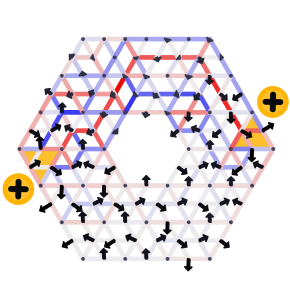 [source] Mechanical metamaterials denote an unconventional class of materials that offer an excellent platform to study various microscopic phenomena at the macroscopic level. Recently we designed and 3D-printed an anisotropic metamaterial, and by careful manipulation of only a small part of its elements, we could mimic topological defects that usually occur, e.g., in liquid crystals.
[source] Mechanical metamaterials denote an unconventional class of materials that offer an excellent platform to study various microscopic phenomena at the macroscopic level. Recently we designed and 3D-printed an anisotropic metamaterial, and by careful manipulation of only a small part of its elements, we could mimic topological defects that usually occur, e.g., in liquid crystals.
Most interestingly, these defects yield an unexpected and hitherto unknown mechanical behavior: upon probing the material in the presence of a topological defect, we can steer the deformations and stresses into predetermined regions of that material, whereas without a defect the material has one trivial mode of deformation and stress. We further explain the origin of this difference in the mechanical response with and without defects by the states of self-stress, i.e., distribution of stresses that do not cause a net force in the material, hence do not deform it. Our studies will pave the way of constructing smart-response materials.
Topological defects produce exotic mechanics in complex metamaterials
A. S. Meeussen, E. C. Oğuz, Y. Shokef, and M. van Hecke
Nature Physics 16, 307 (2020)
Response evolution of mechanical metamaterials under architectural transformations
A. S. Meeussen, E. C. Oğuz, M. van Hecke, and Y. Shokef
New Journal of Physics 22, 023030 (2020)
